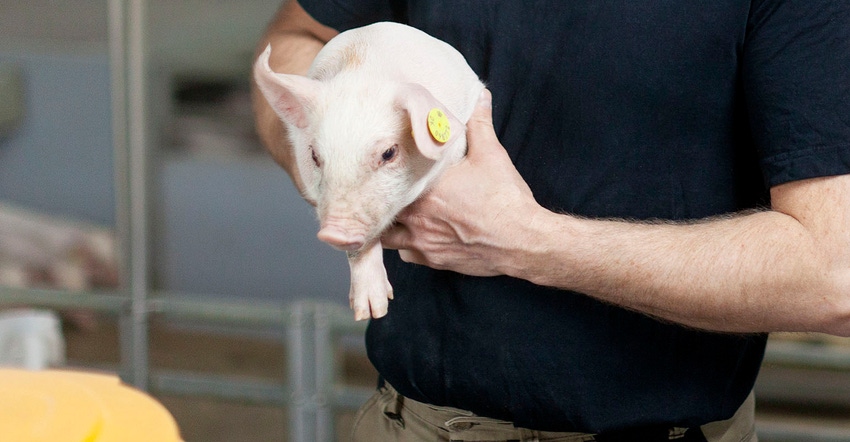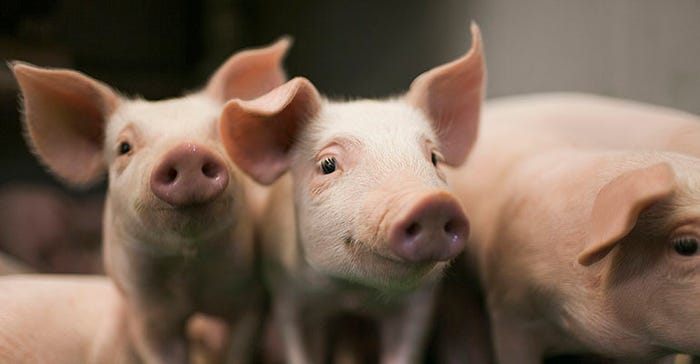Why animal-based proteins can be replaced in nursey diets without compromising piglet health or performance.
April 1, 2021

Sponsored Content
By Diego Navarro, PhD, Swine Nutritionist, Hamlet Protein
All-Vegetable Diets - why animal-based proteins can be replaced in nursey diets without compromising piglet health or performance. Of all the diet phases, nursery diets are consumed the least but are also the most complex and most expensive by volume. The lower the average weaning weight, the more complex the diets tend to be to encourage feed intake. There is high expression of the lactase enzyme at this stage of growth, so these diets typically contain lactose as a highly digestible source of carbohydrate. Animal-based proteins may also be included in early nursery diets and serve as highly concentrated sources of amino acids, B-vitamins, and minerals. These typically include rendered animal by-products ranging from blood meal, meat meal, meat and bone meal, poultry by-products, and fish meal (Meeker and Meisinger, 2015).
Fish meal can be a great source of digestible amino acids, but nutrient composition will vary greatly among sources. The high cost of fish meal prices it out of many modern nursery programs that have access to alternative sources of protein. Meat by-products require the application of high heat to control pathogenic bacteria and viruses, resulting in variable nutrient content and quality (Navarro et al., 2018). Spray-dried plasma has shown to induce feed intake and supply immunoglobulins, specifically IgG, through the diet. The pig's capacity to absorb immunoglobulins reduces drastically 24 to 36 hours after birth (Veum and Odle, 2001), indicating that the main benefit from IgG is to prevent the binding of pathogens to the gut wall (Balan et al., 2020). Spray-dried plasma will drive up diet costs and should only be considered in intensive care diets to stimulate feed intake of weak pigs or in nursery programs targeting traditionally hard starting pigs due to disease challenge.
Feeding an all-vegetable diet to nursery pigs can be tricky but possible with careful consideration of all ingredients coming into the diet. All-vegetable diets simply refer to diets devoid of animal-based proteins. There is nothing magical about these diets; in fact, grow-finish pigs are almost completely fed 100% plant-based diets apart from supplemented vitamins, minerals, and crystalline amino acids. The types of cereal grain and oilseed meal incorporated into the diet is dependent on the geographical region. In the US, corn and soybean meal are staples in pig diets of all stages of production. In other parts of the world, wheat or barley may be the main cereal grains whereas soybean may be partially or completely replaced by rapeseed meal, cottonseed meal, copra meal, or sunflower meal. However, anti-nutritional factors in some cereal grains (e.g. non-starch polysaccharides) and vegetable proteins (e.g. trypsin inhibitors, tannins, gossypol) limit their use in young animal diets. The development of several specialty vegetable proteins with reduced anti-nutritional factors such as HP 300 from Hamlet Protein, and the increasing availability of crystalline amino acids made it possible to completely replace animal-based proteins in nursery diets without compromising piglet health or performance.

Ingredient availability, commodity pricing, biosecurity or ethical concerns, and the preferences of nutritionists often dictate which ingredients are incorporated into the diet formulation. Thanks to technological advances in analytical services, we now live in a time when it is economically feasible to generate detailed nutritional profiles of ingredients on a regular basis. This development enables accurate and precise diet formulation while giving access to previously inauspicious feedstuff of unknown or variable nutrient profiles. Nutrient analysis of incoming feed ingredients, regardless of whether they are of plant or animal origin, should be conducted on a regular basis to minimize the risk of any unexpected nutrition-related issues on the farm. This is especially true for vegetable proteins that are known to have components that are detrimental to young pigs at high amounts such as trypsin inhibitors, lectins, β-conglycinin, saponin, gossypol, and other polyphenols. Diligently balancing the amounts of these anti-nutritional factors that are introduced into the complete diet minimizes the risk of negative effects on performance. Enzyme treated specialty soy proteins from Hamlet Protein do just that. By applying high quality raw materials in a patented bioconversion process, Hamlet Protein lowers the anti-nutritional factors while still maintaining good digestibility and an intact amino acid profile, ensuring better gut health and growth of young animals.
About the Author(s)
You May Also Like



